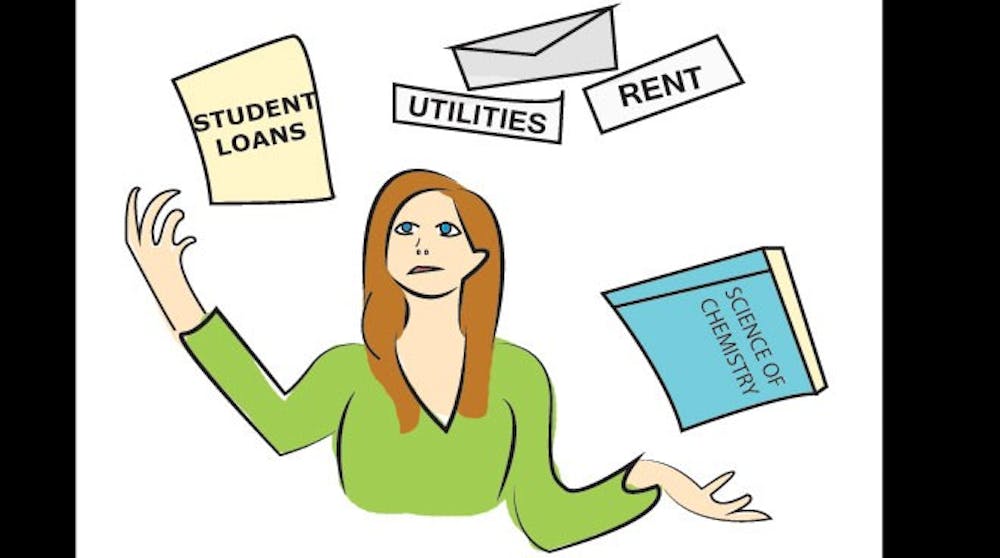When I was traipsing around Scotland during my semester abroad, I noticed that the plastic bags at Tesco, the mainstream supermarket, were streaked with the slogan: "Every little helps." For the life of me, I could not figure out what the missing noun was.
Back in America, President Obama's newest slogan seems to be: "Every little dollar helps." For students, that is. And the slogan seems to make sense.
The Obama Administration released a government analysis called "Making College More Affordable" Oct. 26. The analysis outlines Obama's plan to ensure that federal grants and greater tax benefits make college more affordable for students, according to a White House press release.
The plan is that, as of 2014, all new borrowers will have the opportunity to decrease the amount they pay for student loans to 10 percent of their discretionary income - the chunk of income retained after bills are paid - according to the White House. Loan forgiveness will occur after 20 years of the first loan payment.
But first, when 2012 rolls around, Obama's "Pay as You Earn" strategy will allow this drop in loan payments to be available to about 1.6 million students who will be taking out loans for college. This strategy is a response to the fact that many students need financial relief before 2014, according to the press release.
The benefits of Obama's plan were more apparent when I whipped out my calculator. Were I to be a post-grad in debt at this moment, with an income of $40,000, I would owe $6,000 of my annual discretionary income each month. A year from now, in 2012, I would owe $4,000. Embedded in a current career of studying and babysitting, I realize that a $2,000 drop in monthly payments would boost my financial stance, or that of anyone in a similar situation.
The problem: Those who may be receiving these benefits may not be in a similar situation to Richmond students. The other problem: lack of clarity.
David Curtis, assistant director of financial aid, said the university's administration had participated in the direct loan plan since 1996 or 1997. Under Obama's proposal, what has not yet been made clear is whether the 10 percent will be based on loans received by students after the 2012 implementation date, or whether the reduction can apply to students currently taking out loans, he said.
Yet the 2014 implementation of the plan clearly shows that reductions will affect students who will take loans out after July 1, 2014, Curtis said. Students at Richmond and at other institutions may therefore be eligible to benefit from these reductions in 2014 if they qualify based on overall debt and income, he said.
Obama's plan will alter the current law, which keeps loan payments at 15 percent of a borrower's discretionary income, and does not forgive debt until 25 years have passed since the initial payment, according to the press release.
Based on Obama's ambiguity in terms of who is eligible, it does not seem that current Richmond students would benefit from the implementation of the 2012 plan unless they are students transferring in from other institutions and need to take out fresh loans at Richmond.
Elliott Walden, chairwoman of UR Collegian Republicans, said it was unclear how the proposed savings would be achieved. "It seems pretty obvious that many of these loans are not going to be paid and that tax-payers are going to have to foot the bill for every dollar that is forgiven," she said.
Enjoy what you're reading?
Signup for our newsletter
She said a better proposal would have been to staunch the sky-rocketing cost of tuition, and that this proposal would not solve the post-grad problem of finding employment to actually pay the loans. "Unfortunately, President Obama's 'Pay as You Earn' plan only puts a temporary bandage on a wound that is hemorrhaging," Walden said.
In the press release, Obama did address the fact that congressional action would still be necessary for the establishment of more jobs. But he said the plan would make a difference.
Charles Sabatier, president of UR Young Democrats, said he supported Obama's effort to take more immediate action than Congress. The 10 percent reduction will help Americans have more disposable income and allow the economy to heat up, he said.
But the 20-year forgiveness element could prevent full loan payment and hurt the very private businesses that provided students with loans for college, Sabatier said.
I was practically broke when I returned from my semester in Scotland. I had enjoyed more than my fair share of salsa clubs in Barcelona, sheep sightings in Killarney and pub "hiking" in St. Andrews. But I will never have to pay off student loans. I will have no debt after college, and I am eternally grateful.
I do not know who will benefit from Obama's plan, whether they are my friends or people whose faces I have never seen. But the option Obama has presented is optimistic.
Except after that 20-year period, when loan forgiveness kicks in, and we all hit equilibrium, borrowers and non-borrowers alike. And who will be better off?
Support independent student media
You can make a tax-deductible donation by clicking the button below, which takes you to our secure PayPal account. The page is set up to receive contributions in whatever amount you designate. We look forward to using the money we raise to further our mission of providing honest and accurate information to students, faculty, staff, alumni and others in the general public.
Donate Now


